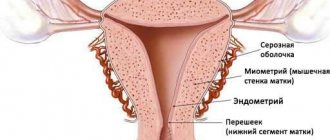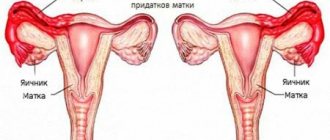Literally from the first days of pregnancy, any woman experiences various uncomfortable sensations in the abdomen, and these sensations, painful and not so painful, accompany her until childbirth. This is not surprising, because the stomach is the focus of all changes occurring in the body of a pregnant woman, their root cause. So there must be feelings. On the contrary, one should be wary if they are not there - such a global restructuring of the body cannot occur in complete “silence”.
All pregnant women have sensations in the abdomen, and they can be different, but almost everyone feels tingling in the uterus during pregnancy. Moreover, doctors call this sensation one of the first symptoms indicating pregnancy, which is associated with the fact that the uterus increases in size.
In addition to tingling, there are other symptoms that indicate conception has occurred. Each of them individually may indicate some disease or pathology, or simply be a random ailment, but together they clearly indicate pregnancy. In this case, tingling in the uterus is one of the first signs of conception.
When should the tingling occur?
The egg is fertilized, and the woman is no longer alone - a new life, a new person, begins to grow and develop in her. Naturally, an event of such magnitude is accompanied by various unusual sensations and, unfortunately, not all of them bring pleasure, which is also quite normal - after all, the body is rebuilt, the usual rhythm of life is disrupted, what was previously normal becomes unacceptable and vice versa. So a pregnant woman has to adapt to the changed reality.
Women do not always attach importance to various minor pains, spasms, tingling sensations, a feeling of heaviness and other sensations in the stomach, considering them just another symptom of gastritis or a reaction to too fatty/salty/spicy/unusual food. However, in the case of pregnancy, we are not talking about gastritis or a reaction to not too healthy food, but about a restructuring of the body. From the second month, the uterus of a pregnant woman is constantly in a state of growth - as is the embryo, which turns from a tiny cell into a baby. In this case, a mild tingling periodically appears, as well as stretching in the uterus and/or on the sides - these sensations are associated with an increase in the size of the uterus, with tension in the ligaments, and this is what leads to nagging pain, which can be unexpected and intensify with sudden sweeping movements. Therefore, you should not jump out of bed too quickly or turn around sharply - such movements can lead to sudden and quite severe pain. In addition, too sudden movements can lead to surges in blood pressure and, as a result, dizziness, headaches and even fainting. So, as you can see, such “gymnastics” are by no means indicated for pregnant women for many reasons.
However, even if we take into account that tingling in the uterus is a natural phenomenon during pregnancy, pregnancy is still a very important period in a woman’s life, and the various sensations that are experienced can be either an absolute norm or symptoms of some pathology. Therefore, in order to be absolutely sure that everything is in order, it is better to consult a doctor with any new sensation that appears, even if everyone around you claims that this is how it should be. Pregnancy is exactly the case when it is better to be safe.
Why does tingling occur in the first trimester of pregnancy?
From about the fifth week of pregnancy, the growth of the uterus begins - from this period the embryo grows so much that it requires more space than a corner for several cells. Since the growth of the embryo is very intense, the growth of the uterus also occurs quite rapidly, which, in turn, leads to tension in the ligaments that support the uterus. At the same time, the ligaments are constantly stretched: they cannot keep up with the growth of the uterus - the sensations are similar to those that occur in adolescents during rapid growth, when the internal organs cannot keep up, and under stress, tingling sensations appear in the sides, chest, and so on. Due to the tension, tingling appears in the groin area, and sudden movements increase pain; even severe coughing or sneezing leads to pain.
Also, the muscles of the anterior abdominal wall adapt to the changing size of the uterus, which also leads to discomfort, especially with sudden movements.
Why does tingling occur in the second trimester of pregnancy?
By the second trimester of pregnancy, the growth of the uterus becomes rapid, resulting in compression of the stomach, intestines and some other internal organs. This is precisely what is associated with emerging problems with the digestive system - flatulence, constipation, and so on, hence the tingling in the lower abdomen. These symptoms are as normal as tingling in the first trimester of pregnancy, and no medical intervention is required. To reduce discomfort, a pregnant woman is advised not to eat spicy, smoked, pickled, or fatty foods; she also needs to drink 1.5-2 liters of fluid per day. In addition, a small-scale diet is recommended, that is, meals should be taken quite often, up to 6-7 times a day, but the portions should be small so that there is no overeating.
Why does tingling occur in the third trimester of pregnancy?
Various sensations in the lower abdomen in late pregnancy are as natural as tingling in the uterus in early pregnancy. But if in the first two trimesters we are talking about an increase in the size of the uterus, then in the third trimester the body begins to prepare for childbirth. After thirty-five weeks, the tone of the uterus periodically increases, its cervix becomes softer, smoothes out - it is preparing for dilatation. At the same time, the tingling in the lower abdomen is stronger than it was before, but it is associated with processes that are completely normal for pregnancy.
Recommendations for the use of Lyapko applicators
• In case of osteochondrosis of the spine, people lie on the applicators with their backs; they can be placed over the entire area of the neck, back, and lumbosacral region. • For headaches, pain in the neck, shoulder girdle, arms, in the heart area, in the upper and middle parts of the chest, the applicators should be placed under the head, neck, shoulder girdle, upper and middle parts of the chest, and added to the hands and feet. • For diseases of the gastrointestinal tract, liver, kidneys, the applicators are applied under the middle or lower back and under the lower back, and to enhance the effect, on the stomach, pressing with a bag of sand. You can use the “Sputnik” or “Malysh” applicator belts for the same areas. • For pain in the lower abdomen, in the sacrum, lower back, lower extremities, as well as for diseases and dysfunctions of the pelvic organs, the Lyapko applicator is used on the lumbar region and the sacrogluteal region and lower abdomen. • In case of injuries, fractures, the applicator is applied to the part of the spine corresponding to the segmental innervation of the injured limb for 15-30 minutes, then above or below the fracture. • To speed up healing and restore bowel function after surgery, applicators are placed above or below the surgical site. • In case of dysfunction of the pelvic organs to induce urination or normalize it, as well as in case of inflammatory diseases of the uterus, appendages, bladder, prostatitis, prostate adenoma, applicators are used under the lumbar and sacro-gluteal region. • For colds, chronic diseases of the lungs and bronchi, the applicator is used as a “mustard plaster”. Area of application: back, cervical-collar region, anterior surface of the chest, sternum area. • To relieve an attack of bronchial asthma, lie on the applicator plate with the cervical-collar area, grasping the middle part of the chest, or use an applicator belt, and use a needle roller or small applicator to apply “painful” pressure to the sternum area and the upper parts of the anterior surface of the chest. At the same time, be sure to hold your breath using the Buteyko method. • In case of a runny nose, allergic or cold etiology, you need to lie on the applicator with the back of the head, and use small applicators to influence the area of the projection of the maxillary sinuses. • For arterial hypertension and severe headaches, applicators are used on the cervical-collar area, mid-thoracic region, neck, head, sacral region, and feet. • For ischemic heart disease, angina pectoris, rhythm disturbances and other diseases of the cardiovascular system, use the applicator to grab the upper and middle parts of the thoracic spine, the area corresponding to the heart on the hand, and the area of the nail bed of the little finger. • For gastric ulcers, pancreatitis - the lower thoracic and lumbar spine, in case of exacerbation - above and below the pain zone (back, abdomen or in the form of a belt). • For varicose veins of the lower extremities, the application zone is the lumbar region, including the lower thoracic spine and the chest area on the right (liver projection area) for 15-25 minutes. • To effectively burn fat deposits, apply the applicator (6.8 mm pitch) to the areas of greatest obesity alternately for 7-10 minutes and the spine area - lumbar region - for 15-20 minutes. • Early pregnancy toxicosis – chest area, upper lumbar region – 10-20 minutes, upper abdomen – 15 minutes. • For pain in the lumbosacral region, to improve blood supply to the uterus and the full development of the fetus - lumbar and sacral zones; the effect is soft, delicate; preferably an applicator with a small pitch (4.9 mm - 5.8 mm). The feeling should be comfortable. • To maintain and stimulate lactation during feeding – upper and mid-thoracic back, 15-20 minutes, 1-3 times a day. • For mastitis, the applicator is placed on the area of inflammation of the mammary gland and the area of the mid-thoracic spine for 10-15 minutes, 1-3 times a day. • For strokes, the applicator is used on all parts of the spine, on the limbs, starting with the healthy side, then on the head and neck area, always completing the procedure with the impact on the feet, sitting or standing. • For diseases of the thyroid gland, act on the cervical spine. Effective is the effect on additional zones: the sacrococcygeal and adrenal gland zones. The procedure should be completed by applying pressure to the feet. Particular attention should be paid to the area of the articulation of the second phalanx of the big toe and the foot (metatarsophalangeal joint of the big toe) - on the plantar and dorsum of the feet.
Do I need a doctor for tingling?
Usually, pregnant women do not think to consult a doctor if they have tingling sensations in the uterus. The fact is that in a normal situation these tingling sensations are very short-lived and do not cause any concern. Most often it is felt as an instant prick in the lower abdomen, sometimes a stabbing sensation radiates to the perineum, but that’s all. As soon as you change position or rest a little, the discomfort goes away. It is believed that in a normal situation such tingling sensations do not last more than an hour.
But there are a number of situations when seeing a doctor is necessary to avoid possible unpleasant consequences:
- bloody and/or dark discharge is a danger signal, if detected, you should immediately consult a doctor, since such symptoms may indicate the onset of spontaneous abortion or placental abruption;
- tingling, pulling sensations, heaviness, and so on cause severe discomfort, and the discomfort does not go away after a short rest, a change of position, or within an hour;
- a feeling of hardness, “stoniness” of the uterus is a danger signal, if detected, you should immediately consult a doctor, since such a symptom means that the uterus is in increased tone, which can lead to spontaneous termination of pregnancy;
- symptoms of cystitis - inflammation of the bladder and/or other infectious diseases, expressed in painful urination, too frequent urination, and the portions of urine are very small, while there is a constant feeling of heaviness in the lower abdomen and a false urge to urinate;
- symptoms of an intestinal infection - diarrhea, vomiting, fever; such symptoms can pose a danger to both the expectant mother and the fetus; if these symptoms are present in combination with abdominal pain, there may even be a pathology that requires surgical intervention (for example, inflammation of the appendix ).
Prolonged tingling in the uterus, that is, lasting more than an hour and not going away with a change of position or a short rest, needs diagnosis. In such cases, a pregnant woman needs to be examined by a specialist and undergo tests, which will make it possible to make a diagnosis and begin treatment of the pathology, if any is identified.
Tingling in the side during pregnancy
If a pregnant woman has a stabbing pain in the right side, it is necessary to check the condition of the intestines, gallbladder and liver. With some diseases, for example, pancreatitis and hepatitis, quite severe pain and pronounced symptoms appear (for example, nausea and weakness).
Tingling during pregnancy and heaviness on the right side are manifestations of cholecystitis, which develops when a pregnant woman’s motor activity decreases or as a result of relaxation of the smooth muscles of the gallbladder due to hormonal changes in a woman’s body. In addition, the gallbladder is compressed by the growing uterus, which also impairs bile secretion. These disorders are often accompanied by belching, nausea and heartburn. A certain diet that can be selected for a pregnant woman by the attending physician will help relieve discomfort.
Tingling in the left side during pregnancy may indicate diseases of the spleen, stomach or intestines.
Tingling in pregnant women
According to statistics, the feeling of tingling in the uterus during pregnancy is not uncommon: every third woman reports such symptoms to doctors from the first weeks after conception. This is natural, since conception means a global restructuring of a woman’s entire body, which includes the growth of the uterus, which causes various sensations in the corresponding area of the abdomen.
However, there are also not so natural and harmless reasons that cause pain in the lower abdomen, and the woman herself cannot distinguish normal from pathology, especially during her first pregnancy. Therefore, it is strongly recommended that if you experience any unpleasant and/or painful sensations, consult a gynecologist, who will determine what causes these symptoms and, if necessary, prescribe treatment.
Conventionally, all sensations and tingling sensations in the lower abdomen during pregnancy can be divided into two categories:
- natural and safe;
- unnatural and requiring the attention of a doctor.
In order not to panic for any reason, you should remember that pregnancy means a huge physiological change for a woman, and the sensations do not have to be pleasant at all. This is especially true for such an important organ for pregnancy as the uterus - after all, it is there that the fetus is born, grows and develops throughout pregnancy.
Minor tingling and pulling sensations in the lower abdomen after the first month of pregnancy are completely normal phenomena that you should not be afraid of. After all, it is from this moment that the embryo begins to turn into a baby - the active growth of the fetus begins and, as a consequence, the growth of the uterus, which grows along with the fetus. But the growth of the uterus cannot occur on its own, because all organs of the human body are interconnected. So, when the uterus begins to grow, the ligaments that hold it begin to stretch, and this causes pulling sensations and mild short-term tingling sensations. Also, rapid growth of the uterus and sprained ligaments can lead to pain in the side - the body responds with pain to sudden movements. If you are not careful, you can provoke a miscarriage, so ordinary physical exercises are not recommended for a pregnant woman, but there are our own complexes that allow you to maintain physical tone, but are safe for the fetus.
Pregnant women claim that tingling in the uterus is most often felt in the evening and at night, but this is not entirely true. It’s just that at this time a woman is usually not busy with anything, resting, her body relaxes, and various sensations are immediately recorded, since they are not obscured by any events.
We recommend reading: HIV during pregnancy, Leukocytes in a smear during pregnancy, Polyps during pregnancy
When women describe a tingling sensation in the uterus, they usually say that it is like being lightly pricked with a needle above the pubis, and then this prick is felt in the groin area. Something similar is felt during egg implantation.
Unnatural tingling sensations in the uterus are:
- sharp stabbing pain;
- bloody and dark discharge, accompanied by sharp pain or without it;
- severe cramps combined with aching pain (the pain is not necessarily severe - it is similar to the pain before menstruation);
- the presence of severe discomfort during tingling.
If you experience such sensations, you should consult a doctor as soon as possible to prevent a threat to the fetus, and in some cases, to the mother.
Abdominal colic during pregnancy
Tingling in the abdomen during pregnancy is most often associated with complications of chronic diseases of internal organs. All tingling sensations in the abdominal area can be divided into the following types:
- Intestinal. Accompanied by constipation, bloating and a feeling of fullness. Such tingling in the abdomen during pregnancy can be caused by heavy foods. If a woman is bothered by discomfort, she should avoid fried, spicy, floury and spicy foods.
- Renal . The result of exacerbation of pyelonephritis or urolithiasis. Tingling sensations during pregnancy in the abdomen can radiate to the thighs and labia.
- Inflammation of appendicitis. Tingling in the right side, radiating to the abdominal area. An accurate diagnosis must be made by a doctor. In case of inflammation of appendicitis, a pregnant woman needs surgery.
Tingling during pregnancy in some expectant mothers appears regularly and has a clear localization, while in others it occurs completely spontaneously. If regular tingling appears in the abdomen, uterus, side or lower back, you should consult a doctor so that he can identify possible abnormalities in a timely manner.
Most often, tingling in the uterus in early pregnancy is not a cause for concern. But doctors strongly recommend treating all changes in the body with caution. After all, sometimes harmless symptoms can hide a serious illness.
Causes of tingling in the first trimester
During early pregnancy, the uterus begins to gradually increase in size. Often this process is accompanied by painful sensations. But even mild tingling in the uterus can cause a lot of anxiety in the expectant mother about this.
- voltage connection;
- muscle adaptation.
Due to the fact that the ligaments supporting the growing uterus begin to stretch, discomfort may occur. Women report pain in the area close to the groin. It can increase significantly with tension in the abdominal muscles, as well as the muscles of the perineum. At rest, the discomfort disappears.
As for the second reason, it is characteristic of the muscles of the anterior abdominal wall.
Since the press gradually loses its former appearance, adapting to the uterus, painful sensations may appear. Often discomfort occurs when bending over, walking quickly or lying on your side.
But if the pain is constant, then the pregnant woman needs to see a doctor. The nature of this phenomenon may indicate diseases of the reproductive system. Often, tingling is a sign of uterine tone, which can provoke a miscarriage.
Pain in the uterus in the second trimester
In the second trimester, the uterus increases significantly in size, and this causes compression of many internal organs.
The stomach and intestines are especially affected, causing disturbances in the functioning of the digestive tract.
With the onset of this period, almost all women suffer from diarrhea, constipation and flatulence. These disturbances in the digestive system can lead to tingling in the lower abdomen. Such sensations are not a sign of any illness, which requires special therapy.
But a pregnant woman must definitely exclude all spicy, smoked and pickled foods from her diet. You will have to forget about your gastronomic preferences for a while, otherwise problems with the digestive tract simply cannot be avoided. In addition, do not forget about drinking enough fluid daily. It is best if it is plain water.
At this stage, you should not worry or become overtired. Since the second trimester of pregnancy is the calmest of the three, the expectant mother needs to enjoy it to the fullest. After all, after the birth of the baby, there will be no time left for rest.
Tingling in the third trimester
Most often, severe pain bothers a woman in the third trimester. Since the body begins to prepare for childbirth, already from the 35th week the uterus regularly becomes more toned. At the same time, her neck gradually smoothes and softens, preparing to open.
The expectant mother may feel severe nagging pain in the abdominal area closer to the due date.
This is also normal, since the baby’s weight puts pressure on the muscles and internal organs. Sometimes pregnant women who are preparing to become mothers for the first time, due to their inexperience, mistake these painful sensations for the onset of labor.
But if a woman, in addition to severe tingling, begins to experience spotting, this may indicate placental abruption. Then you need to immediately call an ambulance. If the detachment is small, then the woman will give birth on her own. But in cases where the detachment of the baby’s place is so strong that it threatens the health of the baby and his mother, a caesarean section is performed.
Sometimes after giving birth, a woman may begin to bleed due to insufficient uterine tone or a slow blood clotting process. If there is large bleeding in the uterus after a C-section that cannot be stopped, doctors may remove the reproductive organ.
When to see a doctor
There are situations that require immediate intervention from medical professionals. You can distinguish a normal phenomenon from signs of a disease by listening to your own feelings. It’s better to ask your doctor again than to deal with additional problems later.
You should definitely contact a specialist if:
- Bloody or brown discharge from the vagina appears.
- The tingling sensation in the uterus lasts for more than an hour.
- There is a feeling of tension in the uterus.
- Urination brings discomfort.
In the normal course of pregnancy, red discharge indicates abruption of the correctly located or presenting placenta. This problem can appear in any of the three trimesters.But most often it appears either in the first or third stage. This phenomenon is often a signal of a spontaneous abortion process.
If the tingling does not go away within 1 hour, you need to call an ambulance. There are many reasons for this phenomenon, among them there may be increased tone of the uterus or damage to this organ. Sometimes tingling sensations can appear as a result of strong emotional overstimulation.
Often a woman may feel tension in the uterus. This means that there is a high risk of miscarriage. If the expectant mother regularly experiences such discomfort, she needs to undergo a gynecological examination. Would
Painful urination may indicate an infection. In order to get rid of it, you need to get tested. Based on the examination results, the doctor will prescribe effective treatment.
Tingling in the uterus during pregnancy is normal and is most often observed in the first trimester.
Many women experience discomfort when walking, turning their torso, or sleeping on their side. But if the pain intensifies and becomes constant, you should immediately consult a doctor.
Often, tingling in the uterus in early pregnancy is not a cause for concern. But doctors strongly recommend treating all changes in the body with caution. After all, sometimes harmless symptoms can hide a serious illness.
Bloody discharge as one of the first signs of pregnancy
At the very beginning of pregnancy, spotting may be observed - slight bleeding, a few dark spots, a yellowish trace. Such discharge does not cause any concern and is usually taken as the beginning of menstruation. However, in fact, this is one of the first signs of pregnancy – implantation bleeding.
Implantation bleeding is associated with the implantation of the embryo on the uterine wall and can begin a week or two after conception. The discharge may be one-time, or it may appear later, which signals the implantation of the fertilized egg into the uterine wall. Such discharge is quite thick - like cream, yellow or pink.
However, if such discharge appears, you should consult a doctor, since this is not necessarily implantation bleeding, indicating pregnancy, but it is also possible that there is increased erosion of the cervix, again as a result of pregnancy, in which case medical intervention may be required.
It should be noted that implantation bleeding does not happen in 100% of cases, so the beginning of pregnancy can be completely avoided.
In what cases should you consult a doctor immediately?
If there is a real threat to pregnancy, timely seeking qualified medical help is very important. In some cases, it is precisely this that helps prevent miscarriage and save the child’s life. Contact your doctor immediately if:
- The tingling turned into pain in the lower abdomen.
- The pain is growing.
- The discomfort lasts for several hours, but is no less intense.
- The pain is short-term, but severe.
- There was bleeding.
- There is active secretion of mucus and purulent vaginal discharge.
- Body temperature has increased and there is chills.
- Weakness, fatigue, increased fatigue, and pallor appeared.
- Cold sweat.
- The surface of the abdomen is very dense.
The described symptoms are a sign of one or another pathology, both directly related to pregnancy and indicating a disease of the genitourinary system that can harm the mother and fetus. Timely contact with a specialist will help prevent a miscarriage, if possible.
Increase and decrease in basal temperature during pregnancy
For one day in the second phase there is a sharp decrease in basal temperature. This phenomenon is called implantation retraction and is considered one of the symptoms of pregnancy. This temperature difference is associated with two hormonal shifts: from the middle of the second phase, the production of progesterone decreases, and it is this that is responsible for the rise in temperature, then, with the onset of pregnancy, the body begins to produce progesterone again, and the temperature rises, in addition, the onset of pregnancy is marked by the release of estrogen, which leads to a sharp decrease in basal temperature. As a result, a dip appears on the basal temperature chart—implantation depression. At the same time, during a developing pregnancy, the basal temperature for the first few weeks remains at 37ºC.
An increase in basal temperature in the first few weeks of pregnancy leads to a deterioration in health, fatigue increases, and the general condition resembles the onset of a cold. It should be noted that at the beginning of pregnancy, real colds are not uncommon, since at this time immunity is somewhat reduced, and catching a cold becomes easier than ever. In this case, you need to be especially careful when choosing medications, or better yet, consult a doctor, since not all medications can be used safely for the fetus.
Breast swelling
Almost all women, after a week after conception, begin to swell their breasts, their breasts become hypersensitive, and often hurt so much that any touch causes severe discomfort. There are exceptions when during pregnancy a woman does not experience the slightest discomfort associated with increased sensitivity or swelling of the breasts. It even happens that in women whose breasts are a little sore and swollen before menstruation, they suddenly stop hurting and swelling, which signals pregnancy.
Another sign of pregnancy is that the skin around the nipples becomes darker in color.
Heaviness in the pelvic area
An increase in blood flow in the pelvic area and a gradual enlargement of the uterus leads to the fact that many women, when pregnancy occurs, begin to feel some heaviness in the pelvic area, as well as a “feeling of fullness,” and consider such sensations to be the first signs of pregnancy, especially since they can appear literally in the first days after conception.
However, an increase in blood flow in the pelvis in combination with the constantly increasing pressure of the fetus also leads to unpleasant consequences: hemorrhoids appear, which can cause very painful sensations, even when they do not burst. It happens that hemorrhoids appear almost from the very beginning of pregnancy, especially if this is not the first pregnancy.
Tingling in the uterus
After the first week after conception, tingling sensations in the lower abdomen may appear - signs of an enlarged uterus, growing simultaneously with the growth of the fetus. Basically, such sensations are completely normal, but in some cases a doctor’s examination is required: if the painful sensations do not go away after a short rest or change of position, if they last more than an hour, if they are accompanied by bleeding, and so on.
Pain in the uterus in the second trimester
In the second trimester, the uterus increases significantly in size, and this causes compression of many internal organs.
The stomach and intestines are especially affected, causing disturbances in the functioning of the digestive tract.
With the onset of this period, almost all women suffer from diarrhea, constipation and flatulence. These disturbances in the digestive system can lead to tingling in the lower abdomen. Such sensations are not a sign of any illness that requires special therapy.
But a pregnant woman must definitely exclude all spicy, smoked and pickled foods from her diet. You will have to forget about your gastronomic preferences for a while, otherwise problems with the digestive tract simply cannot be avoided. In addition, do not forget about drinking enough fluid daily. It is best if it is ordinary water.
At this stage, you should not worry or become overtired. Since the second trimester of pregnancy is the calmest of the three, the expectant mother needs to enjoy it to the fullest. After all, after the birth of the baby, there will be no time left for rest.
Increased fatigue
Already from the first week after conception, women experience increased fatigue, apathy, drowsiness, and memory deterioration. At the same time, even a long rest does not improve the condition, and after rest you feel tired. The symptoms are similar to exacerbation of vegetative-vascular dystonia, but in fact they are the body’s reaction to pregnancy. This happens due to the fact that from the moment of conception, progesterone begins to be released into the blood, which depresses the psyche. The reaction to increased levels of this hormone manifests itself in irritability, depression and apathy. After two and a half months of pregnancy, the placenta begins to produce hormones, and the content of estrogen increases, which stimulate the psyche and balance the effect of progesterone on it.
In order to cope with increased fatigue, drowsiness and other unpleasant symptoms of early pregnancy, or at least reduce their intensity, it is recommended to spend more time in the fresh air - leisurely and calm walks in the parks give excellent results, as well as to lead a measured, calm life, be less nervous, do not overwork, avoid unpleasant impressions.
Sudden changes in temperature can also be considered one of the first signs of pregnancy: often pregnant women in the early stages of pregnancy experience either a feeling of heat or cold, and such changes are not provoked by anything in the external environment. Such sensations are explained by reduced blood pressure and increased temperature in the first trimester; as a result, there is a vascular reaction, to which a rush of blood to the face may be added by the end of the day.
In addition, in the early stages of pregnancy, there is unprovoked anxiety that has no external causes, interrupted sleep, early going to bed and equally early, even too early (at five or six in the morning) rises. Moreover, even classic owls, which under normal conditions cannot be brought to the pillow before midnight, begin to fall asleep early, and they also wake up early, although in normal conditions such an early rise is unthinkable for them.
Nausea, increased olfactory sensitivity
Morning sickness has long been considered a classic sign of pregnancy. It usually appears after the second week of pregnancy and can last almost until childbirth, or it may disappear after some time - depending on your luck. On average, about 50% of pregnant women suffer from nausea to some degree.
There are sometimes such lucky women who are not bothered by nausea throughout their pregnancy, from beginning to end. There are, on the contrary, the unlucky ones who have to suffer almost from the first day of pregnancy to the last. Some argue that the presence or absence of morning sickness depends on the gender of the child, for example, some women with several children experienced nausea only during pregnancy with girls, but they carried boys without any problems, and it happened exactly the opposite. So the dependence of morning sickness on the gender of the unborn child can be considered a legend, of which there are many among pregnant women.
In addition to nausea, there is increased sensitivity to odors. Moreover, disgust can be caused by smells that were previously liked or simply not noticed. For example, many note a sharp aversion to the smell of raw meat, which appears already at the very beginning of pregnancy, and as soon as a pregnant woman catches even a hint of the disgusting aroma, she immediately begins to vomit. At the same time, smells that you previously did not like begin to attract you irresistibly. There are known cases when pregnant women adored, for example, the smell of car exhaust, and in their normal state they felt disgust for this smell, considering it, moreover, extremely harmful.
Unfortunately, the matter may not end with nausea and increased sensitivity to odors. It happens that in addition to nausea, vomiting also begins, not only in the morning, but several times a day, while appetite disappears and increased salivation appears. In addition, taste preferences change. There are many anecdotes about what pregnant women prefer to eat. For example, salted fried strawberries or something else equally exotic. As for salted fried strawberries, of course, this is too much, but the addiction of pregnant women to salty foods is widely known. Sour and salty foods begin to dominate the menu - such products increase appetite and reduce the urge to vomit, so it is not surprising that pregnant women are drawn to them. There are also surprising addictions, for example, eating chalk - a clear sign of a lack of calcium in the body, and in this case, of course, you need to eat not chalk, but more calcium-containing foods, for example, cottage cheese.
Changes in taste and olfactory preferences, nausea and vomiting in pregnant women are explained by a disorder of certain body functions, for example, neuroendocrine regulation, as well as disorders of the central nervous system associated with pregnancy.
However, no matter how natural nausea and other symptoms that are so characteristic of a pregnant woman may seem, it is recommended to consult a doctor when they appear, since this condition can be directly related to pathologies of the digestive system, which can become more active during pregnancy. In some cases, drug intervention is necessary.
In addition to vomiting, toxicosis at the beginning of pregnancy is characterized by increased salivation, which in some cases even leads to a sharp weight loss of the pregnant woman - sometimes even up to three kilograms per week. Such weight loss during pregnancy is extremely undesirable, because the woman loses not only kilograms, but also the strength that is so necessary for the successful bearing of the fetus, as well as nutrition for the fetus, which can lead to deviations in its development. Moreover, if saliva is swallowed, the result is a change in acidity in the stomach, which leads to various digestive disorders - also an undesirable result.
It should be borne in mind that vomiting serves to cleanse the body of various toxins, harmful substances, and so on. That is, on the one hand, the vomiting reaction is beneficial. However, in addition to toxins, saliva, various proteins, enzymes, electrolytes, as well as ingested food are removed from the body through vomit, that is, “fuel” for the normal functioning of the body. Constant vomiting not only leads to weight loss, but also to disruption of water-salt, protein and fat balance, to vitamin deficiency and loss of minerals needed by the body, to disruption of the activity of the endocrine glands. Therefore, if vomiting reactions continue, or if the body weakens, it is strongly recommended to consult a doctor.
Reason 3. Intestinal colic
The growing uterus causes a displacement of all the internal organs and systems of a woman. It can also cause abdominal cramps if normal bowel function is disrupted. Pregnant women always experience a decrease in peristalsis: digested food moves much more slowly, remaining in the large intestine. In this regard, frequent constipation (which can cause hemorrhoids) or flatulence may occur. Intestinal colic is not uncommon in pregnant women. Their appearance can even cause banal overeating or the whims of a pregnant woman while consuming incompatible foods (for example, when a cake is eaten with a pickled cucumber).
Inject on the future part 3
Therefore, at this stage it is important to adhere to some dietary recommendations.
Eat more often, but little by little. Avoid foods that lead to increased gas formation and fermentation - cabbage, legumes, fresh baked goods and sweets. Add plant foods that contain fiber and natural products that have a laxative effect. Forget about fatty meat and rich broth, smoked meats and canned food. Physical exercise will also help here, at least walking, as well as drugs that cause normalization of intestinal motility. For example, the same dill water that a woman will very soon give to her baby for colic in the tummy. Or you can drink a cup of herbal tea, such as chamomile.
Every pregnant woman experiences similar pain. But this is not a cause for concern: you should not limit yourself in movement and prescribe bed rest. Be in the fresh air more often, move more. But don't forget about rest.
However, if pain in the abdomen is accompanied by nausea, diarrhea, vomiting, fever or bleeding, immediately consult a doctor or call an ambulance!
Take care of yourself and be healthy!
Comments: 0
Shooting and swelling
The initial stage of pregnancy is also characterized by mild pain and/or shooting in the lumbar region and/or sacrum. These pains can persist throughout pregnancy, almost until childbirth. Shooting from the pelvis to the legs can also signal the onset of pregnancy.
An increased level of progesterone leads to salt retention in the body, which, in turn, leads to fluid retention. The consequence of this is swelling of varying degrees of severity, but in the early stages of pregnancy they are usually small - if you clench your fingers into a fist, you feel that the fingers seem to have gotten thicker, the rings become too small, and when you press your finger on the shin, a mark may remain that quickly passes.
Swelling can accompany a pregnant woman until childbirth. Moreover, swelling may increase. It happens that swelling appears against the background of severe toxicosis of pregnancy in the second or third trimester, and is so strong that it is simply impossible to clench your fingers into a fist - they become so swollen. It also becomes difficult to wear tight shoes - your feet swell. In case of such toxicosis, you should immediately consult a doctor.
The first trimester of pregnancy is also characterized by headaches, and they are considered an indirect sign of pregnancy. This condition is associated with a sharp hormonal jump, in fact, a hormonal shock, to which a pregnant woman is exposed almost immediately after conception, but by the end of the first trimester, the hormonal levels normalize, and headaches stop tormenting the pregnant woman.
In the early stages, colitis in the uterus!
Ira | 01/08/2014, 07:40:56
- Nothing, not even literacy.
- 7. | 08.01.2014, 12:26:40
In the early stages of 3-4 weeks you need to consult a doctor. I don’t understand when people come to the forum with such questions. Not about medicine and doctors in general, but when something really hurts, drags, suspicions about something, etc., and they sit here waiting for the topic to come out, for them to answer, it’s amazing. - 8. | 08.01.2014, 16:45:57
- 10. | 03.02.2014, 21:01:12
Are your colics gone? I had straight wild ones at 4-5, I don’t remember how many weeks (now 18), I lay in bed, moaned, drank MagneB-6, papaverine, noshpa, valerian. It was constantly stabbing somewhere down to the left. And then everything went away gradually. I still didn’t understand what it was... Implantation... intestines (most likely) - 11. | 18.02.2014, 08:17:41
I also had a doctor prescribe papaverine motherwort noshpa, then it all went away and it’s unclear why this happened, you’d better go see a doctor! - Guest Maybe she doesn’t have the opportunity to go to a doctor, I like it when they start judging without really knowing anything.
- 14. | 13.05.2014, 07:40:45
Girls, I have the same problem, 4 weeks, and colitis in different places, there is no way to go to the doctor.
- Subscriptions
The user of the Woman.ru website understands and accepts that he bears full responsibility for all materials partially or fully published by him using the Woman.ru service. The user of the Woman.ru website guarantees that the placement of materials submitted by him does not violate the rights of third parties (including, but not limited to copyright) does not damage their honor and dignity. The user of the Woman.ru site, by submitting materials, is thereby interested in their publication on the site and expresses his consent to their further use by the editors of the Woman.ru site. All materials of the Woman site. ru, regardless of the form and date of publication on the site, can only be used with the consent of the site editors. Reproduction of materials from the website Woman.ru is impossible without the written permission of the editors. The editors are not responsible for the content of advertisements and articles. Opinions of the authors may not coincide with the editorial board. Materials posted in the “Sex” section are not recommended for viewing by persons under 18 years of age (18+) When visiting the woman.ru website, you accept the Rules for using the Woman.ru website, incl. and regarding cookies
Flatulence, bloating, intestinal problems
Often, when pregnancy occurs, a woman feels that her stomach is bloated, while the enlargement of the uterus is still insignificant and cannot lead to such sensations. The feeling of an enlarged abdomen is usually provoked by the condition of the intestines - increased gas formation leads to bloating, as well as flatulence. The fact is that during pregnancy, the intestines work more slowly than usual, peristalsis is slowed down, as a result, the contents of the intestines move more slowly, constipation occurs, the stomach bloats, and a large amount of gastric gases are produced. The root cause is the same hormonal changes in the entire body, in which the vessels of the abdominal cavity fill with blood more than usual, the consequence of which is swelling of the intestinal walls with all the unpleasant consequences, ranging from flatulence and constipation to bloating.
One of the initial signs of conception that has occurred includes frequent urination - a pregnant woman can run to the toilet both day and night, and this happens much more often than usual, portions of urine can be either normal or significantly reduced. At the same time, frequent urination is not accompanied by any unpleasant sensations, characteristic, for example, of cystitis - with inflammation of the bladder, frequent urination also occurs, but it is painful, accompanied by pain and burning. Around the fourth month of pregnancy, urination frequency returns to normal. This phenomenon is also associated with changes in hormonal levels, as well as intestinal problems. An increase in the level of female sex hormones ensures increased blood flow to the vessels leading to the pelvic organs. As a result, the functioning of the organs responsible for removing urine from the body—the kidneys, ureters, and bladder—changes.
Nutrition for pregnant women
Another reason for feeling abdominal pain in the second trimester can be due to banal poor nutrition of a pregnant woman. The resulting spasms of various organs of the digestive system lead to the appearance of painful, aching sensations in the lower abdomen. If you had problems with stool before pregnancy, and there was colitis, or various intestinal disorders against the background of dysbiosis, then this can also cause pain in the abdomen.
Natural abdominal pain can occur due to frequent constipation, which is typical for the second trimester. The rapidly growing uterus puts pressure on the intestines, slowing down its wave-like movements called peristalsis. Due to these intestinal contractions, the remains of processed food move through the intestines, right up to the rectum. The growing uterus slows down these movements, and with improper nutrition, more gases and hormonal changes do not stand aside. They cause nagging pain in the abdominal area. The only way out is simple: normalize your diet, consume more fluids, vegetables, rye bread, fruits and move more, preventing stagnation of the intestines.
If suddenly a woman engages in any physical activity, this is reflected by overstrain of the abdominal muscles and, as a result, pain is felt. For it to stop, just rest and try to relax.
Changes in blood pressure
The onset of pregnancy is usually marked by slight changes in blood pressure - most often there is a decrease in pressure, which leads to weakness, drowsiness and other symptoms associated with a decrease in blood pressure.
A significant deterioration in well-being associated with a decrease in blood pressure is possible if a woman had a tendency to hypotension before pregnancy. In this case, during pregnancy, significant drops in pressure are possible (down to values less than 90/60 mmHg). The consequence of such drops in pressure is weakness, headache, dizziness, and fainting.
Women prone to low blood pressure are not recommended to take too hot baths or stay in a stuffy room. Eating food in a timely manner can improve your well-being; if you have problems with blood pressure, you should be careful about your diet. You should also definitely sleep at least 9-10 hours at night; in addition, a short daytime siesta is recommended - for 1-2 hours, if not sleep, then at least quiet rest on the sofa.
Other causes of pain
Abdominal pain may occur in the second trimester with a displaced pregnancy or an ectopic pregnancy. Very rare, but attacks of acute appendicitis, acute inflammation of the pancreas, and intestinal obstruction are possible. Such disorders are accompanied by dizziness, nausea, vomiting, and fever. If such signs are present, immediately call an ambulance.
In any case, if you feel something, do not rush to panic and get upset. Calmly observe yourself and be judiciously aware of your sensations. If something confuses or worries you, go to the doctor. Even if it is not so scary, you will see for yourself that your fears are groundless. If the pain is systematic and intense, again, go to the doctor. The sooner you find out the reason, the sooner you can solve it. Under no circumstances should you self-medicate, take baths or do any other procedures you have heard or seen. Just solve the issues with the doctor, and everything will be great.
Increased appetite
At the beginning of pregnancy, many women's appetite increases significantly. It happens that some people literally cannot leave the refrigerator while there is at least something edible left in it. Often you are drawn to certain foods, but it happens that the “zhor” is simply all-encompassing - treat all foods at once, as long as they are edible. This increase in appetite is considered one of the indirect signs of pregnancy. This phenomenon is associated with changes in hormonal levels, which stimulates appetite. Subsequently, when hormonal levels return to normal, appetite also normalizes, but addiction to certain foods may persist - the body instinctively chooses what it lacks.
Vaginal discharge, thrush
When pregnancy occurs, secretions begin to be released from the vagina - this is considered one of the early signs of conception. This phenomenon is due to an increase in blood supply to the pelvic organs. At the same time, the secret amount of hydrogen ions increases, designed to protect the pregnant woman’s body from various pathogens. Unfortunately, this phenomenon also has an unpleasant downside: such an environment is beneficial for the proliferation of yeast fungi, which causes thrush in pregnant women, and this can lead to the spread of infection to the fetus, as well as to an increased susceptibility to ruptures of the tissues of the birth canal . Therefore, at the first sign of thrush, you should consult a doctor.
Menstrual irregularities
Menstrual irregularities are a sign of pregnancy, which almost all women consider the most true and significant. A missed period is usually the reason a woman takes a pregnancy test. However, menstrual irregularities may not be associated with pregnancy; there are enough diseases and pathologies that can lead to this phenomenon. But with an active sexual life, the first and most likely explanation is still pregnancy. So the use of the test is quite justified. And most often it gives a positive result.










